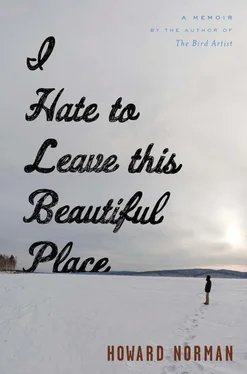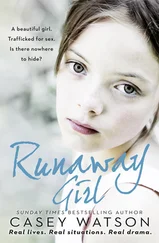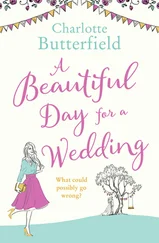Anyway, when she and I were done talking, I served more tea and brought out some carrot cake. We laughed over the photographs in a biography of Groucho Marx I’d been reading. Emma walked in the door, home from school, and immediately went upstairs to hang out with Jehan; she showed him her collection of key chains and took those photographs of him. I remember that, even without noticeably registering incipient concern, I felt some relief when mother and child left. I watched through the front window as they walked over to look at the Church of the Blessed Sacrament like tourists. Then I went upstairs to take a nap, or talk with Emma, or start dinner, I cannot recall. At the time, I was quite pleased, I believe especially on Jehan’s behalf, but for both of them, that for a few months they’d have a cozy house where life could be lived, a playground nearby, a thousand books, a writing desk, light-filled rooms, classical music CDs in stacks, a rectory of Irish and South Asian priests next door.
From my mouth to God’s ear, I wish I had said, “No, terribly sorry, but this housesitting situation isn’t possible.”
Reetika Vazirani had left a telephone message for Jane’s best friend, Jody, to the effect that she was “in trouble” and to come to the house as soon as possible. Jody had barely known Reetika Vazirani either, but Jody had a key to the house. Given the amount of time between when the message was left and the murder-suicide took place, apparently Jody’s assignment was to discover the bodies — can you imagine? — which Jody eventually did, and quickly alerted neighbors. The police and paramedics soon arrived. In a matter of hours yellow crime-scene tape covered both back and front porches like a garish Halloween prank. And as the investigation got under way, the news spread, and demons began to stand on a lot of hearts.
At the end of August, I flew down to Washington from Vermont and stepped into the house at about five-thirty in the evening. I had asked friends in advance to take down the three early-twentieth-century Dutch portraits hanging in the living room. The grim expressions on the Dutch faces had always struck me as judgmental almost to the point of satire, and I was convinced that these anonymous personages were witnesses and we shouldn’t have to run the risk of seeing horror reflected in their eyes.
On the other hand, many gifts had arrived to redeem the walls. Antonin Krathovil had sent one of his photographs. Jake Berthot had sent one of his exquisite drawings of trees. Kazumi Tanaka had sent her woodcut of Japanese cranes lifting from a pond. My friend Elizabeth had sent a photograph of the wild coast of British Columbia she had taken.
I opened a lot of windows, put an LP of Chopin’s nocturnes on the old-school record player, and stood for a moment at the entrance to the dining room, looking at the new shellacked floorboards I’d ordered to replace the bloodstained boards. I looked at the houseplants that university colleagues had delivered. I set my Olivetti down on the dining room table. Facing the corner of the dining room where the bodies had been found, I began typing letters. I wrote to William in Hawaii; Stuart and Caren in Michigan; Rick and Rhea in Vermont; Bill and Trish in Vermont; Alexandra in Vermont; David in California; Mr. and Mrs. Malraux in Paris; Peter on Long Island; Jerry and Diane in California; my old ornithology professor Dr. Cleveland in Vancouver; Melissa Church in Seattle; Michael in Toronto; Deborah in Woodstock, New York; Michael, a portraitist of birds in St. Johns, Newfoundland; my college friend Richard in Florida; Mona in Paris; my mother, Estella, in Michigan.
I do not fully understand why I went on such an epistolary binge — all told, perhaps thirty letters, the briefest five single-spaced pages and some as long as twenty. Naturally, besides the fact that letter writing had always helped organize my emotions, I trusted that my friends would tolerate moodiness, outright despair, exhausted humor, philosophical nonsense, and everything else. I was drinking espresso after espresso; letters were stacking up next to the typewriter; I switched from Chopin to Bach’s compositions for cello and works by Kodály, all performed by János Starker — these selections obviously not seeking ebullience but rather an accompaniment to melancholy. Sleep was out of the question. Letter after letter after letter.
At around three A.M., with cicadas whining in the enormous tulip poplar tree in the front yard, which especially during high winds I had always felt was too close to the house, I was suddenly famished and — quite surprised to have an appetite at all — decided to make spaghetti, which in any season I considered comfort food. With the heat and humidity still coming in through the nighttime screens, I started to boil water in a big pot and took some spicy meatballs out of the freezer. I opened a bottle of red wine. The recipe would be makeshift. I emptied a can of tomatoes into a saucepan and added tomato paste and spices.
All of this had great possibilities, I felt, and then, as the saying goes, right out of nowhere —this is impossible to capture — I “felt” something was terribly wrong in the house. Not that something terribly wrong had occurred; needless to say, I already understood that. No, the definite sensation, but with an indeterminate source, was of something occurring. In progress. What is more, I had suddenly contracted a blistering headache. What else could I do but question my own exhaustion. Was I thinking clearly? What trick was my mind playing? No matter, no matter. I stopped cooking and — again, I cannot pinpoint the reason — was drawn upstairs to my third-floor attic study.
I switched on the desk lamp and immediately noticed a novel on the floor. I cannot recall the title, but the author was Penelope Fitzgerald. How odd, I thought, because whenever I left for the summer, I would without fail clear my desk, file away papers, put pens and pencils in a jar, everything neat and clean and in its own place. Yet here was a novel on the floor.
I picked it up and absent-mindedly flipped through the pages. I stopped at an arrow pointing from a passage Reetika Vazirani had underlined to her comment in the margin: How could she write sentences like this? She should be pilloried on the TV news. It can’t be forgiven. I thought that this might have been laughable, evidence of a critical mind in high dudgeon or an exasperated bitchiness, yet given the circumstances, I had to sit down.
Turning the swivel chair to face the desk, I went through the novel page by page, discovering numerous underlined sentences and seemingly endless comments, some tactful and erudite, most expressing over-the-top outrage and dismissal of all worth. The inventory of suggested punishments for “poor sentences” was truly mind-boggling.
Sitting there, I happened to glance at the bookended line of upright black notebooks I had filled. Tucked in among them was a much smaller, squarish notebook. As I eventually discovered, this was one of thirty-three three-by-five-inch black notebooks that Reetika Vazirani had hidden throughout the house. Ultimately they required a macabre sort of treasure hunt whose negative reward was a gut-wrenching and permanently regretful reading experience. In that one notebook alone, amid drawings of Medusa heads, gargoyles, and clearly identifiable Hindu gods — some devouring children — were succinct rehearsals of the murder of her son, mentioning him by name. This writing was so penetratingly grotesque that all I could manage was to stumble down to the second-floor bathroom and vomit for a good half hour.
Given all this, it may sound unlikely to suggest that anything I found in one of her notebooks could offer the least solace. But as I knelt on the cold tiles (themselves soothing to the touch) I noticed, atop some magazines and books on a small shelf, a much larger blue notebook, a journal, and I opened it at random and read:
Читать дальше












